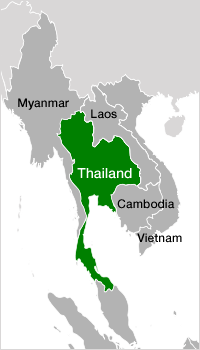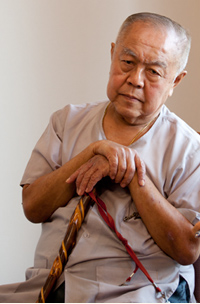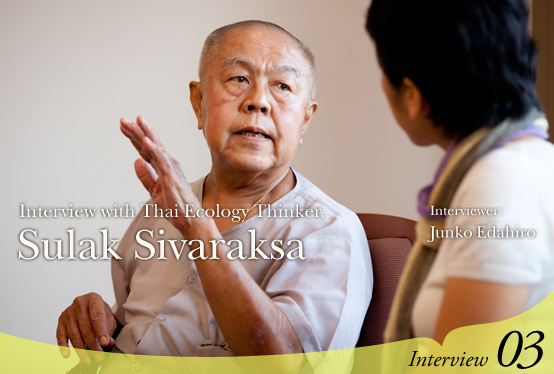- Junko :
- When I read your book "The Wisdom of Sustainability: Buddhist Economics for the 21st Century", I am very interested in your breathing for meditation. Do you think this is one of the ways to recover or restore our sense of interconnectedness, to open ourselves to nature or to the surroundings?
- Sulak :
- Yes. Breathing is so essential, but we ignore it.
- I think we have to move away from what is not essential to what is essential. When you go to something essential, you realize in your life what is the most essential. People don't realize that, but the most essential element in our life is breathing. If you don't believe in breathing, if you stop breathing for five minutes, you are dead.
- Junko :
- (laughing)
- Sulak :
- Breathing is very simple. When you get up in the morning, instead of rushing, take two or three minutes, breathe in and breathe out. Today is a wonderful day, so appreciate the day. If it rains, it is beautiful and wet. If the sun shines, it is beautiful too. The best moment is the present moment.
- Breathe in mindfully, slowly, not in anxiety nor in a lot of pollution. Breathe in peacefully, breathe out mindfully.
- Buddha helped you to be mindful. Patience is a wonderful thing. So you learn to see things positively. That is one thing.
- Secondly, learn to be peaceful. Be peace inside. Otherwise you will be so violent. So breathe. In deep breathing, we learn to be peaceful.
- And the next step, you must learn to reinstall our consciousness, to be aware that we are connected with others. We must connect with the poor. Their suffering is our suffering. We have our lifestyles that have created their suffering. Perhaps, expose yourselves to them. Learn from them as friends. I think this is how we change.
- In return, in Buddhism, we are told we all have Buddha nature. The Quakers believe that we all have God with us. Tremendous. That means we are something special. It doesn't mean we should be arrogant. Being special means that we should be kind. We should be humble. We should serve others. The more we want to serve others, and the more we want to help others to be happy, we should be happier too. But if you want to be happy, take care of others who are unhappy. The more you have, the more you are unhappy.
-
And feel connection with others. In my culture, in Thai language, we call the river "mother water." We call the Earth, "mother Earth." We call rice, "mother rice." Each year, we have festival called as "Earth water." But all this is gone. The plotting of the Thai festival has become just for tourism. Everything is for money. Everything is for sale. So I think we have to come back to our essence, interconnectedness, for example, breathing.

- Junko :
- Right. Starting with deep breathing and recovering our sense of interconnectedness, these things can be started by ourselves as individuals. But in order to change the structure of the society that drives consumerism for globalization, how can we depart from the money-oriented, growth driven society or economy?
- Sulak :
- By two things. Once you learn to reconstitute your consciousness, you see what is essential. You see that cars may be useful but are also harmful. Money could be useful, but also harmful. Even thought could be useful and harmful.
- With that in mind, you also need good friends to help you, those who have more experience, those who have learned more, perhaps about Buddhist economics, those who have learned more about social structure, who see violence, which is harmful. We learn from those good friends. Good friends will tell you even what you don't want to hear, and will become a voice of conscience.
- We need to understand the social structure if we want to change it. We don't want to have an oppressive system, but we should not hate the oppressor. If you hate the oppressor, you want to be violent. That's not the answer to change the structure.
- You see, the Dalai Lama is one excellent example. Tibet has been occupied by the Chinese for 50 years. They burned down more than 6,000 temples, killed many monks, tortured many nuns, raped many nuns, and what the Dalai Lama asked was to love the Chinese. They are also fellow human beings. They also have Buddha nature. So share dialogue with Chinese and we should change together.
- I think that is tremendous way of doing things. It is very radical. Indeed the Dalai Lama said that world peace will not be possible unless each of us cultivate peace within. He said this is the most difficult task to do, but that it is the only way.
- In the old way, all revolutions went violent. So we will have to start a new paradigm, non-violence.
- Junko :
- Non-violence. Yes. When we see, for example, the Japanese government's mishandling of the Fukushima nuclear power plant situation or the earthquake-affected areas, it is very natural for us to have a kind of feeling of hatred against the Japanese government or officials or big companies or whatever. But you say that we have to have love for these people. And at the same time, we can start to change from ourselves. Then if we can have enough individuals who start from themselves to change, maybe we can change society or the economy.
- Sulak :
- Yes. Five years ago, I was arrested for obstructing the gas pipeline from Burma. A big international corporation from America and a big international corporation from France collaborated with the Burmese government, with the Thai government. They claimed that they can get gas cheaply from Burma to our country. The Burmese and international corporations laid the pipeline, destroyed forests in Burma, killed many people in ethnic minorities who had resisted the Burmese government. And they came to my country, destroyed our primeval forest, so I went there to stop them. I was arrested, you know.
- I didn't hate them, even those whom I wanted to stop the pipeline. But eventually, the minister who arrested me offered an apology. The Thai company which instigated my arrest now realized that they made a mistake. They became my good friends eventually. Having good friends is a wonderful thing in life. They may have a different stance and a different approach. But I think that is how to change things.
- Junko :
- But how can you make friends with people who arrested you? Is that because you overcame the differences, or you can see the shared vision?
- Sulak :
- I think this is where you need proper breathing.
- Junko :
- Hm.
- Sulak :
-
Because you breathe. He also breathes. The tree also breathes. We don't want to cut the trees. We don't want trees to die. If all the trees die, we can't survive. I learned so much from the Tibetans.

This walking stick was I got from an American lady when I was marching in Washington DC a few years ago. A monk who marched with me was tortured by the Chinese government for 18 years. He was 20 years older than me. But he looked much younger. So I asked him, "How can you keep so young, so healthy?" He said that when he was tortured, he breathed deeply. He asked for forgiveness for the one who tortured him. Eventually he was released and they became friends.
Hatred doesn't help you. You become angry. And you become violent. The message is to reduce the violence and to cultivate more loving kindness. Loving kindness, first of all, to yourself, to your friends, to your parents, and then you spread to those who you don't know, and you spread to those who are against you. That is the idea.





